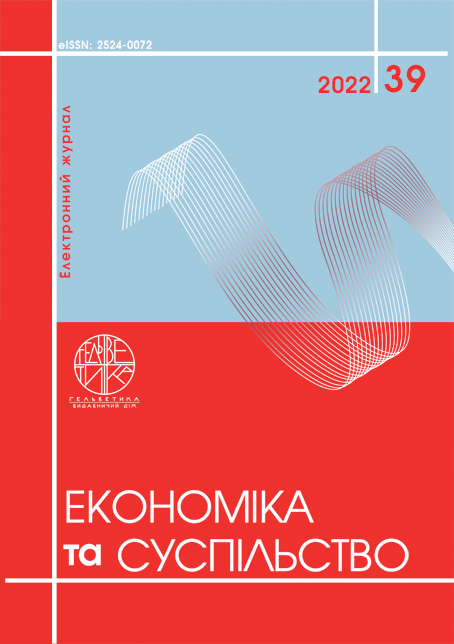ЦИРКУЛЯРНА ЕКОНОМІКА ЯК МЕХАНІЗМ ДОСЯГНЕННЯ ЦІЛЕЙ СТАЛОГО РОЗВИТКУ В УМОВАХ ГЛОБАЛІЗАЦІЇ ТА ДІДЖИТАЛІЗАЦІЇ СВІТОВОЇ ЕКОНОМІКИ
Анотація
Стаття присвячена актуальним питанням визначення впливу розвитку циркулярної економіки на досягнення цілей сталого розвитку в умовах глобалізації та діджиталізації світової економічної системи. Зазначено, що значний потенціал для реалізації принципів сталого розвитку має цифрова дистрибуція, яка в умовах глобалізації та діджиталізації світової економічної системи призводить до зміни поведінки споживача та зміни його світогляду. Автором запропоновано циклічний механізм впливу інформації на рівень життя населення. На основі аналізу здійснено висновок , що концепція сталого розвитку стала головною парадигмою розвитку суспільства на перспективу, а розвиток циркулярної економіки можна розглядати як один з механізмів досягнення цілей сталого розвитку через зв'язок з такими процесами, як діджиталізація та глобалізація світової економіки, активізація інноваційної діяльності, розвиток цифрової дистрибуції.
Посилання
Allwood J.M. Squaring the circular economy: the role of recycling within a hierarchy of material management strategies. Handbook of recycling. Elsevier, 2014, рp. 445–477.
Yatsenko O., Zavadska Yu., Khrystenko O., Musiiets T., Aksyonova O. Innovative transformations of the agricultural complex in the context of global challenges of sustainable development. Financial and credit activity problems of theory and practice. 2021. Т. 5. № 40, рp. 216–224.
Іващенко О.А. Політекономія сталого розвитку: інституційні важелі забезпечення трансформаційного управління. Стратегія розвитку України: фінансово-економічний та гуманітарний аспекти : матеріали VII Міжнародної науково-практичної конференції. Київ : «Інформаційно-аналітичне агентство», 2020. С. 235–238.
Резнікова Н.В., Панченко В.Г., Іващенко О.А. Вплив конкуренції інфраструктурних проєктів США та КНР на глобальну економічну кон'юнктуру та економічну безпеку країн, що розвиваються: боргові, технологічні і фінансові важелі тиску на сталий розвиток. Економіка та держава. 2021. №. 8. С. 10–16.
Мешко Н., Ніколаєнко А. Аналіз впливу екологізації бізнесу на засадах циркулярної економіки на сталий розвиток туризму країн Європи. European Journal of Management Issues. 2021. Т. 29. №. 3. С. 162–170.
Нагара М.Б. Циркулярна економіка: генезис, структура, особливості. Економіка та держава. 2021. №. 10. С. 68–73.
Набока Р.Ю. Концептуальні засади державного регулювання розвитку циркулярної економіки в Україні. Інвестиції: практика та досвід. 2021. №. 15. С. 136–139.
When Fossil Fuels Run Out, What Then? URL: https://mahb.stanford.edu/library-item/fossil-fuels-run/
How much gold is there left to mine and what happens if Gold runs out? URL: https://tavex.fi/en/how-much-gold-is-there-left-to-mine-and-what-happens-if-gold-runs-out/
Seven countries with the largest iron ore reserves in the world. URL: https://www.nsenergybusiness.com/features/world-iron-ore-reserves-countries/#
Take Action for the Sustainable Development Goals. URL: https://www.un.org/sustainabledevelopment/sustainable-development-goals/
Historical carbon dioxide emissions from global fossil fuel combustion and industrial processes from 1750 to 2020. URL: https://www.statista.com/statistics/264699/worldwide-co2-emissions/
Individuals using the Internet (% of population). URL: https://data.worldbank.org/indicator/IT.NET.USER.ZS
Allwood J.M. (2014) Squaring the circular economy: the role of recycling within a hierarchy of material management strategies. Handbook of recycling. Elsevier, рp. 445–477.
Yatsenko O., Zavadska Yu., Khrystenko O., Musiiets T., Aksyonova O. (2021) Innovative transformations of the agricultural complex in the context of global challenges of sustainable development. Financial and credit activity problems of theory and practice, Т. 5, vol. 40, рp. 216–224.
Ivashchenko O.A. (2020) Politekonomiia staloho rozvytku: instytutsiini vazheli zabezpechennia transformatsiinoho upravlinnia. [Political Economy of Sustainable Development: Institutional Levers of Transformational Governance] Stratehiia rozvytku Ukrainy: finansovo-ekonomichnyi ta humanitarnyi aspekty: materialy VII Mizhnarodnoi naukovo-praktychnoi konferentsii. Kyiv: «Informatsiino-analitychne ahentstvo», pp. 235–238. (in Ukrainian)
Reznikova N.V., Panchenko V.H., Ivashchenko O.A. (2021) Vplyv konkurentsii infrastrukturnykh proiektiv SShA ta KNR na hlobalnu ekonomichnu koniunkturu ta ekonomichnu bezpeku krain, shcho rozvyvaiutsia: borhovi, tekhnolohichni i finansovi vazheli tysku na stalyi rozvytok. [The impact of competition from US and Chinese infrastructure projects on the global economic situation and economic security of developing countries: debt, technological and financial levers of pressure on sustainable development]. Ekonomika ta derzhava, vol. 8, рp. 10–16. (in Ukrainian)
Meshko N., Nikolaienko A. (2021) Analiz vplyvu ekolohizatsii biznesu na zasadakh tsyrkuliarnoi ekonomiky na stalyi rozvytok turyzmu krain Yevropy. [Analysis of the impact of greening business on the basis of a circular economy on the sustainable development of tourism in Europe] European Journal of Management Issues, Т. 29 (3), рp. 162–170. (in Ukrainian)
Nahara M.B. (2021) Tsyrkuliarna ekonomika: henezys, struktura, osoblyvosti. Ekonomika ta derzhava, vol. 10, рp. 68–73. (in Ukrainian)
Naboka R.Iu. (2021) Kontseptualni zasady derzhavnoho rehuliuvannia rozvytku tsyrkuliarnoi ekonomiky v Ukraini. [Conceptual principles of state regulation of the development of the circular economy in Ukraine] Investytsii: praktyka ta dosvid, vol. 15, рp. 136–139. (in Ukrainian)
When Fossil Fuels Run Out, What Then? URL: https://mahb.stanford.edu/library-item/fossil-fuels-run/
How much gold is there left to mine and what happens if Gold runs out? URL: https://tavex.fi/en/how-much-gold-is-there-left-to-mine-and-what-happens-if-gold-runs-out/
Seven countries with the largest iron ore reserves in the world. URL: https://www.nsenergybusiness.com/features/world-iron-ore-reserves-countries/#
Take Action for the Sustainable Development Goals. URL: https://www.un.org/sustainabledevelopment/sustainable-development-goals/
Historical carbon dioxide emissions from global fossil fuel combustion and industrial processes from 1750 to 2020. URL: https://www.statista.com/statistics/264699/worldwide-co2-emissions/
Individuals using the Internet (% of population). URL: https://data.worldbank.org/indicator/IT.NET.USER.ZS


